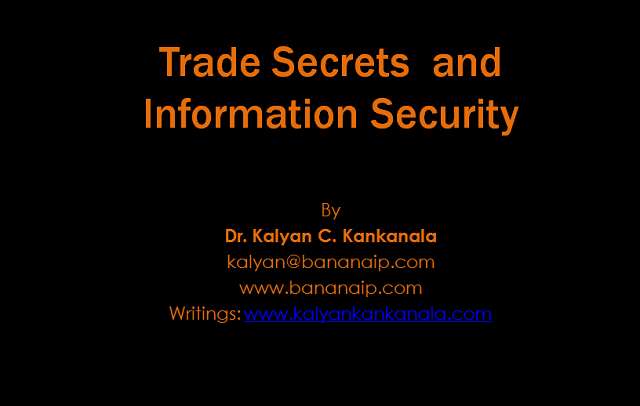First Publication Date: 21st December 2009
Trade Secret in India is not protected under any specific law but Indian Courts from time to time have recognized that confidential business information, such as customer lists, details of suppliers, pricing policies, product launch time-schedules, management marketing, know-how, designs, drawings, model, specifications, surface data, notes, improvements, technical information and so on may qualify as trade secrets.
The jurisprudence that has developed in relation to trade secrets and confidential information is by way of case laws. In light of this, following and successive posts will be devoted in bringing out the case law jurisprudence relating to trade secrets and confidential information in India so that the development of law in this regard may be understood.
John Richard Brady and Ors V. Chemical Process Equipments Pvt. Ltd. and Anr (1987) – Delhi High Court
The case in dispute involved plaintiff asking for the permanent injunction to restrain the defendant from infringing Copyright of the plaintiffs and from passing off the defendants’ products made after acquiring the know-how and confidential information of the plaintiff.
The facts of the case were such that the plaintiff had come up with the idea of growing fresh green grass as basic food for livestock in a compact unit capable of producing grass throughout the year irrespective of external climatic conditions. In light of this, he developed an original Fodder Production Unit (hereinafter called as “FPU”) in the year 1972 and decided to start a phased program to manufacture the FPU in India for both domestic and export sales, for which he sought quotations from the defendant for the supply of thermal panels manufactured by the defendant. To enable the Defendants to send their quotations, all the technical material, detailed know-how, drawings and specifications concerning the FPU were shared with the defendant under a confidentiality agreement, wherein defendants agreed that during the pendency of the agreement, defendant would not manufacture these panels for anybody else nor would be instrumental in divulging the details and the specifications furnished to them. However, later, on discovering the inability of the defendants to supply the required thermal panels, plaintiffs did not place an order to the defendants. It was alleged that in the meanwhile, the defendant made a number of visits to the locations where the plaintiffs’ FPU were in operation with a view to acquiring the working know-how and technology of the FPU. After some time, the plaintiffs learned that the defendants had come up with a machine, which looked like a false representation of the plaintiff’s FPU. Given the backdrop, the plaintiff alleged that the defendant had committed a breach of confidence by wrongfully converting and misappropriating know how, information, drawings, designs, and specifications of the plaintiff disclosed under the confidentiality agreement. It was also alleged by the plaintiff that the machine produced by the defendant was an inferior version of the plaintiffs’ FPU, which caused immense damage to the plaintiffs’ business and reputation. Further, he contended that the know-how, drawings and other technical documents like specifications were not a matter of public knowledge and were by their nature confidential and that the unauthorized use of the labor of the plaintiff who prepared them provided a ‘spring-board’ to the defendant, by which defendant had obtained an unfair advantage over the plaintiffs’ work.
In light of the above, the defendant contended that they had neither infringed Copyright nor they are liable for breach of any of the terms of the agreement. They alleged that there are several other firms making such machines in the international market for a long time. The defendant denied that the plaintiff had given them any drawings or technical material or know how concerning the FPU. They alleged that plaintiffs “supplied specifications only with regard to the thermal panel in order to enable the defendants to make quotations and also a tray to know the size of the thermal panels”. They denied having committed any breach of confidence as alleged by the plaintiffs. It was alleged that the machine produced by the defendant was different from that of the plaintiffs in respect of several substantial functional features and pleaded that when a comparison is made of the production units in the international market, they would appear similar but there would be vast difference in the matter of technical and mechanical designs and process conditions and hence, they had not violated any of the rights of the plaintiffs .
Based on the allegations and contentions from both the parties, the Court observed that the machine of the two parties was strikingly similar. Further, the defendant also had access to the drawings of the plaintiffs. Court also observed that the defendant had not shown how in fact they had arrived at their machine. In light of this observation, Court held that the plaintiff has made out a strong prima facie case of infringement of their copyright, and of strict confidentiality under which specifications, drawings, and other technical information about the FPU were supplied to the defendants. Court clearly laid that it would be in the interest of justice to restrain the defendants from abusing the know-how, specifications, drawings and other technical information regarding the plaintiffs’ FPU entrusted to them under the confidentiality agreement, which defendants had used as a ‘spring-board’ to jump into the business field to the detriment of the plaintiffs. And therefore, Court restrained the defendants from manufacturing and selling machines that were substantial imitation and reproduction of the drawings of the plaintiffs’ FPU or from using in any other manner whatsoever the know-how, specifications, drawings, and other technical information about the FPU disclosed to them by the plaintiff.
The analysis of the above case helps us in understanding that drawings, specifications, technical information and so on have been considered a trade secret and confidential information by the Indian Courts. Further, the importance of confidential agreement has also been clearly laid in this case.



